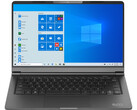The Apple iPad Pro 11 (2021), like the larger 12.9-inch model, utilises Apple's M1 SoC. Last year, Apple caught plenty of attention for its inaugural in-house chipset, which it debuted in the MacBook Air and MacBook Pro. The pair surpassed expectations by outperforming comparable Intel processors while delivering great battery life. So theoretically, equipping the iPad Pro with an Apple M1 SoC makes sense, especially as Apple has been touting its premium tablets as laptop replacements for over five years.
iPadOS remains the most significant limitation with any Apple tablet though, in our opinion. Apple's tablet OS is not necessarily limited compared to Android, but limitations exist when comparing iPadOS with macOS, or any desktop OS for that matter. Simply, MacBooks offer better data management and program support than iPads do, making the former more versatile than the latter.
So, nearly six years on, the same complaints about the iPad Pro remain. However, the iPad Pro could replace a laptop for some people. Apple has done a great job at implementing its Pencil, for example, while its optional keyboard dock allows the iPad Pro 11 (2021) to be used as a daily or office companion. Ultimately, the iPad Pro 11 (2021) is a tablet, so it is good that Apple continues to stick with iPadOS, in that sense.
Undoubtedly, iPadOS and macOS will grow closer in the future. The Apple M1 is an important building block towards that symbiosis, even if Apple is yet to embrace the two OSes' convergence fully. You can read our full thoughts on Apple's latest 11-inch iPad Pro in our review.
Price & Availability
The version tested here (8 GB/128 GB, Wi-Fi and 5G) of the Apple iPad Pro 11 (2021) is available from Apple and Amazon, among other retailers.





















